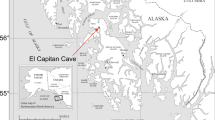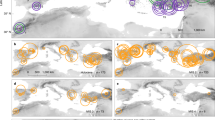Abstract
PROF. A. P. COLEMAN1 contends that the late Palæozoic glacials of the southern hemisphere could never have been formed upon a large, single continent—Gondwana—as visualized by supporters of the hypothesis of continental drift. He has protested that, for such an ice-cap to have developed, there must have been sources of evaporation at hand in the shape of warm seas, and has accordingly denied the existence of any such continent and along with it the hypothesis of drift. It is difficult to follow his argument in the face of recent work on this problem.
This is a preview of subscription content, access via your institution
Access options
Subscribe to this journal
Receive 51 print issues and online access
$199.00 per year
only $3.90 per issue
Buy this article
- Purchase on Springer Link
- Instant access to full article PDF
Prices may be subject to local taxes which are calculated during checkout
Similar content being viewed by others
References
NATURE, 142, 998 (1938).
"Our Wandering Continents". Fig. 9 (1937).
"Ice Ages, Recent and Ancient" (1926).
Author information
Authors and Affiliations
Rights and permissions
About this article
Cite this article
DU TOIT, A. Antarctica and Glacial Ages. Nature 143, 242–243 (1939). https://doi.org/10.1038/143242b0
Published:
Issue Date:
DOI: https://doi.org/10.1038/143242b0
Comments
By submitting a comment you agree to abide by our Terms and Community Guidelines. If you find something abusive or that does not comply with our terms or guidelines please flag it as inappropriate.



